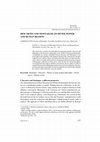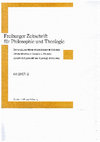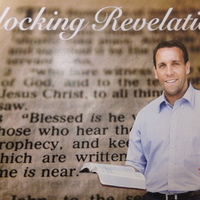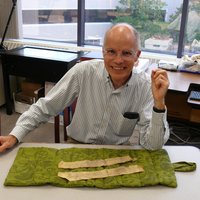Books by Alfredo Gatto
C e n t r o d i S t u d i P a t r i s t i c i " L u i g i Ma r i a V e r z é "
Editions and Translations by Alfredo Gatto

In altre città gli sarebbe stato facile trovare filosofi [...] in grado di dialogare con lui, ma ... more In altre città gli sarebbe stato facile trovare filosofi [...] in grado di dialogare con lui, ma egli si sentiva attratto piuttosto dagli animali, dalle acque, dalle montagne, dal clima di ciascun paese con i suoi mutamenti [...] al fine di conoscere meglio la natura delle cose che risultano meno familiari alla maggior parte dei dotti." (A. Baillet) 25,Abu Dhabi) -Il teatro e la pietà secondo Descartes Érico Andrade Marques de Oliveira (UFPE) -L'irriducibilità delle passioni in Descartes Edgard Vinícius C. Zanette (UERR) -Controversie sulla fi losofi a cartesiana in Brasile: Martial Gueroult e la tradizione brasiliana METAFISICA, VERITÀ E SOGGETTIVITÀ Ethel Menezes Rocha (UFRJ) -Auto-causazione e verità eterne Marcos Gleizer (UERJ) -Descartes e la libera creazione delle verità eterne Mariana de Almeida Campos (UFBA) -Le defi nizioni della sostanza in Descartes Raul Landim Filho (UFRJ) -Idea, essere obiettivo e realtà obiettiva nelle Meditazioni di Descartes Enéias Júnior Forlin (UNICAMP) -La concezione cartesiana del soggetto: l'anima e l'animale razionale Marcos Alexandre Borges (UERR) -Il cogito è una rappresentazione? Un dibattito sull'interpretazione rappresentativa del presupposto della metafi sica cartesiana EPISTEMOLOGIA E FILOSOFIA DELLA NATURA César Augusto Battisti (UNIOESTE) -L'ordine delle ragioni in Descartes Marcio Chaves-Tannús (UFU) -Le regole utili e chiare di Descartes: un commentario esplicativo Lia Levy (UFRGS) -Il concetto cartesiano di attributo principale Djalma Medeiros (FSB-SP) -Sulla legittimità dell'uso di principi teleologici nella scienza della natura in Descartes e Leibniz Paulo Tadeu da Silva (UFABC) -La natura della materia e la spiegazione cartesiana dei fenomeni meteorologici DESCARTES E LA STORIA DELLA FILOSOFIA Giulia Belgioioso (Università del Salento) -A proposito di novatores e nova philosophia Igor Agostini (Università del Salento) -Come costituire un Nouvel Index scolastico-cartésien? Homero Santiago (USP) -Fedeltà geometrica. Il problema dell'ordine nei Principi della fi losofi a cartesiana di Spinoza Siegrid Agostini (Università del Salento) -Cartesii Philosophia. Per una storia della fi losofi a cartesiana in Puglia attraverso i manuali Fábio Baltazar do Nascimento Junior (UFU) -Aristotele, Sesto e Descartes sull'auto-confutazione dello scettico CONTROVERSIE Sebastiano Ghisu (Università degli Studi di Sassari) -Dal virtuale all'evento. Gilles Deleuze e Alain Badiou NOTE CRITICHE Valentina Sperotto (Università Vita-Salute San Ra aele di Milano) -Attenzione e relazione: sull'ecologia dell'attenzione di Yves Citton Erminio Maglione (Università Vita-Salute San Ra aele di Milano/Université François Rabelais de Tours) -Nietzsche interprete di Descartes nella lettura di Giuliano Campioni 9 7 8 8 8 5 7 5 5 2 9 9 6
Gioacchino da Fiore è una delle figure più enigmatiche ed influenti dell'intera tradizione mediev... more Gioacchino da Fiore è una delle figure più enigmatiche ed influenti dell'intera tradizione medievale, e la sua opera rappresenta un unicum nel panorama della storia della filosofia. Grazie alla radicalità della sua esegesi apocalittica, l'abate calabrese diede voce e sostanza ad un nuovo immaginario, disegnando una cartografia simbolica e figurale del tempo a venire. Fra le sue opere più importanti, vanno ricordate la Concordia Novi ac Veteris Testamenti, l'Expositio in Apocalypsim e il Tractatus super quatuor Evangelia.
Indice Presentazione, di Francesco Mattei 7 Introduzione 11 1. Filosofare nell'epoca di Palestrin... more Indice Presentazione, di Francesco Mattei 7 Introduzione 11 1. Filosofare nell'epoca di Palestrina 29 2. Introduzione alla lettura del Commentario al De Anima di Aristotele 65 3. La dottrina dell'Intelletto agente 93 4. Metamorfosi dell'etica peripatetica 127 5. Aristotelismo e non aristotelismo 167 6. Una metafisica dell'Intelletto 187 7. Bibliografia 211 7 Presentazione È apparso di recente, in questa stessa collana, un bel saggio di Cristiano Casalini, Aristotele a Coimbra. Il Cursus Conimbricensis e l'educazione nel Collegium Artium (2012). Appare ora, e con piacere lo presento al lettore italiano, in veste di direttore della collana, uno studio sullo stesso argomento del collega Mario Santiago de Carvalho, dell'Università di Coimbra: Psicologia ed etica nel Cursus Conimbricensis.
Il DE DIVINA OMNIPOTENTIA è una piccola gemma incastonata nella storia della filosofia. In questo... more Il DE DIVINA OMNIPOTENTIA è una piccola gemma incastonata nella storia della filosofia. In questo breve opuscolo, Pier Damiani consegna alla riflessione medievale un pensiero inaudito, destinato a dare voce ad una delle più radicali apologie della volontà e libertà divine.
Papers by Alfredo Gatto

«Recherches de Théologie et Philosophie médiévales», vol. 89, n. 2, pp. 257-278, 2022
Latin theologians traditionally took a paraenetic and allegorical approach to the Apocalypse, und... more Latin theologians traditionally took a paraenetic and allegorical approach to the Apocalypse, under the influence of Tyconius (d. 390 A.D.) and Augustine (d. 430 A.D.). Yet, in the 12 th century, something changed in the way the Apocalypse was read; the paraenetic and allegorical approach came to be complemented or even replaced by an approach treating the Apocalypse as being about the actual history of the world-past and future. Scholars by and large agree that Joachim of Fiore was one of those who brought about this change. But how? In this essay, I will investigate this question and show that Joachim's apocalyptic exegesis is part of a cultural shift that was ongoing at the time Joachim was active: Rupert of Deutz (d. 1129 A.D.), for instance, had already proposed to read the Apocalypse as a historical account of the Church. There is, however, something that singles out Joachim as distinctively innovative in his approach, I argue, namely his hermeneutical method based on the concordia, that is, the correspondence between the two Testaments. We can best understand this by investigating how Joachim handles the seven seals and their relative "openings," considered as historical periods which Jewish and Christian people lived, are living and are about to live through. I will use the issue of how to interpret the seven seals as a lens through which to study comparatively Rupert of Deutz and Joachim, and I will argue that the latter has the most novel and even radical approach to the Apocalypse. I will also show that a study of Joachim's stance on the seven seals across his works is a useful tool for a more general reappraisal of his thought.

«Rivista di Filosofia Neo-Scolastica», vol. 114, n. 2, pp. 433-448, 2022
This article analyses the role played by the Cartesian theory of eternal truths in Malebranche’s
... more This article analyses the role played by the Cartesian theory of eternal truths in Malebranche’s
thought. It aims both to underline the reasons that led Malebranche to criticize Descartes’ doctrine and to analyze how this opposition played a key role in the development of his own reflection. Malebranche denied the assumptions of Descartes’ theory to avoid those that he believed
were the epistemological consequences of the doctrine, namely, the contingence and fragility of
human knowledge and the impossibility of establishing a stable relation between God and man.
Besides, Malebranche’s approach is required to lay the groundwork for his theodicy: the indifference of Cartesian God, in fact, would never let Malebranche investigate God’s reasons in
order to justify his actions. Thus, the article shows that the refusal of Cartesian theory represents
one of the conditions of possibility of Malebranche’s reflection
«Phenomenology and Mind», vol. 15 (2018), pp. 194-210, 2018
The article deals with the critical reception of the Cartesian theory of the eternal truths. It a... more The article deals with the critical reception of the Cartesian theory of the eternal truths. It aims to analyze the central role played by Descartes’ doctrine in Early Modern Philosophy, with particular regard to the reflections of Leibniz, Malebranche and Spinoza. Indeed, part of their philosophy can be considered as an attempt to criticize the premises of the Cartesian theory in order to avoid their consequences. There are then strong reasons for believing that the importance of the theodicean issues in Early Modern Philosophy is directly related to Descartes’ doctrine of the free creation of the eternal truths.
«Quaestio – Annuario di storia della metafisica», vol. 18 (2018), pp. 557-569
All rights reserved. No part of this publication may be reproduced, stored in a retrieval system,... more All rights reserved. No part of this publication may be reproduced, stored in a retrieval system, or transmitted, in any form or by any means, electronic, mechanical, photocopying, recording, or otherwise, without prior permission of the publisher. Questo numero di Quaestio è stato realizzato con contributi parziali del Progetto PRIN 2012 «L'universalità e i suoi limiti: meccanismi di inclusione ed esclusione nella storia della filosofia e nei dibattiti filosofici contemporanei / Universality and its Limits: Strategies of Inclusion and Exclusion in the History of Philosophy and Contemporary Philosophical Debates»
«Educação e Filosofia», vol. 33, n. 68, pp. 721-746, 2019
Cet article vise à analyser la réception de la théorie cartésienne des vérités éternelles dans le... more Cet article vise à analyser la réception de la théorie cartésienne des vérités éternelles dans les oeuvres de Leibniz et Malebranche. Les deux auteurs ont critiqué et refusé ses prémisses pour éviter les conséquences dont ils pensaient qu"elles découlaient de la doctrine de Descartes. L"objectif est celui de démontrer qu"on ne peut pas comprendre pleinement leurs réflexions sans les interpréter à la lumière de la théorie cartésienne, dans la mesure où elle représente la condition critique de possibilité de leur approche philosophique.

"Filozofia", vol. 76, n. 2 (2021), pp. 137-150, 2021
This article aims to analyze the philosophical relationship between Descartes and Montaigne on di... more This article aims to analyze the philosophical relationship between Descartes and Montaigne on divine power and human reason. Within Cartesian historiography, a relationship was usually established between Descartes and Montaigne to cast more light on the originality of the approach that Descartes introduced to the philosophical scene. On the contrary, the main goal of this article is to show how Descartes' theory of eternal truths positively incorporated and preserved some aspects of Montaigne's reflection on divine power. Were this the case, the historiographical interpretation that tends to establish a link between the two authors in order to separate Descartes from Montaigne would at least need to be integrated. This does not mean denying the originality of Cartesian approach, but more broadly defining the context in which Descartes voices his opinion.
Descartes and the Jesuits, in C. Casalini (ed.), Jesuit Philosophy on the Eve of Modernity, Brill, Boston-Leiden 2019, pp. 405-425, 2019

"Freiburger Zeitschrift für Philosophie und Theologie", vol. 64, n. 2 (2017), pp. 323-343
In un'opera di riorganizzazione sistematica della metafisica, come quella compiuta dal teologo ge... more In un'opera di riorganizzazione sistematica della metafisica, come quella compiuta dal teologo gesuita Francisco Suárez con le sue Disputationes metaphysicae (1597) in vista di una precisa ridefinizione del nesso tra filosofia e teologia, era quasi "naturale", per così dire, che ci si riferisse -come a un criterio ermeneutico imprescindibile -al principio della cosiddetta "unicità del vero", divenuto canone ufficiale con la bolla papale Apostolici regiminis promulgata nel 1513 dal V Concilio Lateranense. In realtà, nel trattato suareziano di metafisica il riferimento non è esplicito, 1 ma verrebbe da dire che esso è presupposto ed esercitato in una forma speciale. Se infatti il tema dottrinale (e disciplinare) della bolla riguardava la consonanza di principio -o almeno l'impossibilità di un disaccordo, di principio e di fatto -tra quanto affermato circa l'immortalità dell'anima dalla sapienza teologica rivelata e quanto su di essa si può affermare secondo la ragione naturale; nelle Disputationes di Suárez tale principio viene assunto -al di là del problema dell'anima immortale -in una triplice scansione: a) come fondamento del nesso disciplinare tra teologia rivelata e metafisica; b) come principio dell'articolazione interna della metafisica (naturale), tra discorso sull'ente e discorso su Dio; c) come teorizzazione di un piano trascendentale di possibilità metafisica della verità in generale. Si tratta di tre passaggi che in realtà costituiscono un plesso unico e interconnesso.

"Giornale di metafisica", vol. 2 (2017), pp. 571-589
Alfredo Ferrarin, Chi ha paura dell'intuizione? Roberta Lanfredini, I and the Other. Matter and E... more Alfredo Ferrarin, Chi ha paura dell'intuizione? Roberta Lanfredini, I and the Other. Matter and Experience of time in Phenomenology Luigi Filieri, Sinossi e Sintesi in Kant Guglielmo Califano, Intuizione trascendentale, sapere trascendentale e sistema nella Differenzschrift di Hegel Pia Campeggiani, Psicofisiologia dell'esperienza poetica nello Ione platonico Alessandra Fussi, Kolnai and Aristotle on the Role of Proximity in Fear and Disgust Danilo Manca, Husserl e l'intuizione delle forme Luca Vanzago, La partizione originaria. Riflessioni fenomenologiche sull'esperienza del dolore OsservatOriO Laura Candiotto, The Reality of Relations Elena Mancini, Pensare il dolore ricerche critiche Alfredo Gatto, Il residuo dell'anima. La Scientia de Anima cartesiana e il Cursus Conimbricensis fra metafisica e fisiologia Giacomo Petrarca, Angoscia e redenzione. Il problema della temporalità in Søren Kierkegaard Fabiola Falappa, Metafisica e spiritualità in Husserl. Il senso della fenomenologia tra "Ideen i" e "Meditazioni cartesiane" Caterina Resta, L'impossibile. Il potere e la morte tra Heidegger e Levinas Massimo Giuliani, Rav Joseph B. Soloveitchik in the Context of Contemporary Philosophies of Religion 2 2017
"Con-Textos Kantianos. International Journal of Philosophy", n. 5 (2017), pp. 138-149
The Life and Works of Joachim of Fiore, in M. Riedl (ed.), A Companion to Joachim of Fiore, Brill, Leiden-Boston 2017, pp. 20-40, 2017










Uploads
Books by Alfredo Gatto
Editions and Translations by Alfredo Gatto
Papers by Alfredo Gatto
thought. It aims both to underline the reasons that led Malebranche to criticize Descartes’ doctrine and to analyze how this opposition played a key role in the development of his own reflection. Malebranche denied the assumptions of Descartes’ theory to avoid those that he believed
were the epistemological consequences of the doctrine, namely, the contingence and fragility of
human knowledge and the impossibility of establishing a stable relation between God and man.
Besides, Malebranche’s approach is required to lay the groundwork for his theodicy: the indifference of Cartesian God, in fact, would never let Malebranche investigate God’s reasons in
order to justify his actions. Thus, the article shows that the refusal of Cartesian theory represents
one of the conditions of possibility of Malebranche’s reflection
thought. It aims both to underline the reasons that led Malebranche to criticize Descartes’ doctrine and to analyze how this opposition played a key role in the development of his own reflection. Malebranche denied the assumptions of Descartes’ theory to avoid those that he believed
were the epistemological consequences of the doctrine, namely, the contingence and fragility of
human knowledge and the impossibility of establishing a stable relation between God and man.
Besides, Malebranche’s approach is required to lay the groundwork for his theodicy: the indifference of Cartesian God, in fact, would never let Malebranche investigate God’s reasons in
order to justify his actions. Thus, the article shows that the refusal of Cartesian theory represents
one of the conditions of possibility of Malebranche’s reflection